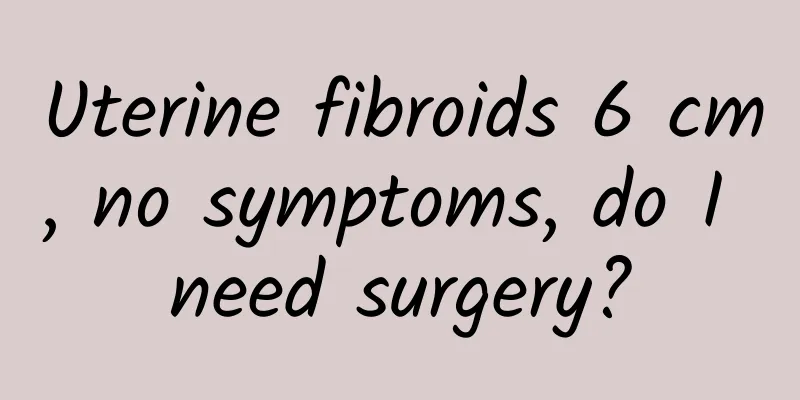Uterine fibroids 6 cm, no symptoms, do I need surgery?

|
If the uterine fibroid is 6 cm and there are no symptoms, you can usually choose to observe it temporarily instead of rushing to surgery. In this case, doctors usually recommend regular monitoring of changes in the fibroid. 1. The importance of observation and monitoring: For patients with uterine fibroids who have no symptoms, regular B-ultrasound examinations are very important. By monitoring the size and growth rate of the fibroids, doctors can determine whether the treatment plan needs to be adjusted. If the fibroids grow rapidly in a short period of time, or symptoms such as irregular menstruation begin to appear, surgery may become a necessary option. 2. Consideration of quality of life: If uterine fibroids do not affect daily life and women have no fertility needs, they can choose to continue observation. Quality of life is an important consideration. Asymptomatic fibroids usually do not affect quality of life, but if they begin to affect daily activities or psychological state, surgery may be an option to improve quality of life. 3. Impact on fertility plans: For women who have fertility plans, uterine fibroids may affect pregnancy. Although fibroids are benign lesions, they may change the environment in the uterus and affect the implantation of fertilized eggs. If you plan to get pregnant, especially if you encounter difficulties in trying to get pregnant, surgery may be a necessary step to ensure the best conditions for pregnancy. 4. Symptoms and treatment: Some women may experience dysmenorrhea, increased menstrual flow and other symptoms as the fibroids gradually grow. These symptoms not only affect the quality of life, but may also indicate other potential effects of fibroids on the body. In this case, surgery can effectively relieve symptoms and prevent further health problems. 5. Individualized treatment plan: Each patient's situation is different, and the treatment plan should be individualized. The doctor will comprehensively evaluate whether surgery is needed based on factors such as the size and location of the fibroids, the patient's age, symptoms, and fertility needs. Maintaining good communication with the doctor and understanding your condition and treatment options are the key to developing a health management plan that best suits you. The treatment of uterine fibroids requires a combination of many factors. Regular monitoring, paying attention to changes in symptoms, and communicating with doctors are effective ways to ensure health. For any health problem, it is always the wisest choice to consult a professional doctor in time. |
<<: I am full term and my stomach hurts like menstruation.
>>: How to induce menstruation when the endometrium is 7mm
Recommend
Experts discuss the key points of postoperative conditioning for uterine fibroids
Patients with uterine fibroids should know that p...
How much does a hysteroscopy cost?
Patients in the clinic often ask the doctor, I co...
Eat avocados to control blood sugar, lose weight, and treat neck pain ~ Nutritionist: No more than 1/2 avocado a day
In the colorful world of weight loss, what foods ...
Does compression of chocolate cyst hurt? What are the hazards of chocolate cyst?
Although the material life has been greatly impro...
What are the best ways to treat uterine fibroids?
Uterine fibroids are one of the most common gynec...
What are the consequences of long-term irregular menstruation?
What are the consequences of long-term irregular ...
Will the uterine wall become thicker when a woman is pregnant? Does thickening of the uterine wall mean intrauterine pregnancy?
Although the uterus is an important part of the f...
What are the symptoms of Nabothian cyst?
What are the symptoms and characteristics of Nabo...
The key to successful weight loss: get rid of belly fat first! Remember the three steps of abdominal massage
Which part of the body is most likely to be affec...
What does functional uterine bleeding mean?
Dysfunctional uterine bleeding is a type of abnor...
What medicine is good for irregular menstruation at 39 years old
What medicine is good for irregular menstruation ...
How to treat habitual miscarriage
How to treat habitual miscarriage? Habitual misca...
Is medical abortion painful? What are the precautions for medical abortion?
Today's society is becoming more and more ope...
Patients with ectopic pregnancy should be aware of their early symptoms in time
Due to the influence of factors such as bad livin...
Super super fat man successfully lost 71 kg in 2 moves
Obesity is not a blessing! According to a British...









